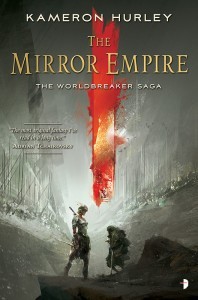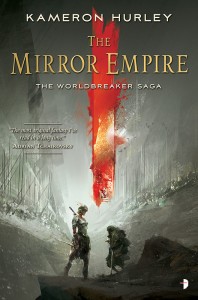
On the surface, The Mirror Empire, the first volume in Hurley’s The World Breaker Saga, is an epic fantasy about two warring empires. Not a wholly original concept, but Hurley’s take on the familiar story is a relentless avalanche of a novel that crams so many original ideas — clever magic, the intertwining politics of the warring empires, cultures with non-binary genders — that the familiarity of the overall plot is a beacon for readers to orient themselves while navigating Hurley’s twisted imagination. Her willingness to overtly and wholly subvert conventional genre tropes, specifically the Hero’s Journey1, is a testament to both Hurley’s understanding of the genre and her willingness to tear the house down around her just so she can build it up again. The Mirror Empire works both as a traditional secondary world fantasy, and as a complete dissection of the genre — few authors have the chops to pull off such a bold narrative.
“Sometimes prophets of the cataclysm get lucky.”Nasaka Lokana Saiz, The Mirror Empire, p. 169
Hurley often jokes that she receives mail from her readers about their frustration with not being able to nail down the villain of her story – or the hero. The Mirror Empire follows four main characters — Lilia, Zezili, Roh, and Akhio.Their labyrinthine paths through the novel blur the line between the concept of heroes and villains, a common trope in secondary world fantasies. Hurley sets up Lilia in the mold of a traditional hero — orphaned scullery-girl with a hidden past — and yet she does some despicable things when faced by a desperate and dangerous world. In parallel, Captain General Zezili, responsible for carrying out the genocide of thousands of Dhai, makes some choices that the reader must begrudgingly respect, or even admire.
Hurley’s mirrored empires are not black and white, light and dark, wet and dry. They are grey, and dim, and muddy.
The Mirror Empire isn’t always an easy novel to read. Violence pervades theworld at almost every turn, and Hurley never checks her punches. Where many novels give their characters (and the reader) a break between traumatic scenarios, and opportunity to breathe, Hurley throws haymaker after haymaker. A jab from the left is the only relief she offers. Hurley creates such a state of misery for all of her characters, especially those that are more passive in their engagement with the world, that they’d be happy to jump ship into a Robin Hobb novel just for a break.
Much has been said of ‘grimdark’ as a sub-genre of secondary world fantasy, and The Mirror Empire will greatly appeal to fans of Mark Lawrence or Joe Abercrombie. Where Hurley’s writing excels is in her ability to create dramatic and horrifying situations that not only trouble the reader, but also provide context for the world and events unfolding before their eyes. The bloody evisceration of Hurley’s delicate worldbuiling is like a punch in the gut because she turns expectations on their head at every turn. There are so many admirable aspects to her cultures and her characters that the pain from their betrayal hurts even more. Even while working within the generally accepted bounds of ‘grimdark,’ Hurley still finds room to poke fun at the concept:
“Why don’t you want us here?” Roh said. “We’re fighting the same enemy. We should be friends.”
Wraisau grinned and glanced over at Driaa. “You must admit,” he said, “he grows on you.”
“It’s dumb talk,” Driaa said.
“It’s the way we all sounded before the war,” Wraisau said.
“I never sounded like an illiterate Dhai,” Driaa said.
“I can read,” Roh said.
“Ze means you lack wisdom,” Wraisau said, using the Saiduan pronoun for ataisa2 to refer to Driaa. “But to be honest, I could do with some company who has a little more hope than sense these days.”
The Mirror Empire, p. 221
Hurley forces readers to examine situations and tropes that are accepted as genre conventions – tropes, cliches – by flipping gender conventions around (dismissing them entirely by adding new genders to her societies; writing a character who changes gender throughout the novel) and putting male characters into situations usually held for women, and vice versa. With the rape and objectification of women so prevalent in this ‘grimdark’ fantasy market, Hurley’s clever and calculating treatment of Anavha will make even the staunchest of red-blooded readers quiver. And we have to ask ourselves why a scene where a man is almost raped by several female soldier’s is so unsettling, while flipping those genders around feels passe. What does that say about the sub-genre’s tendencies towards rape? Hurley takes the idea of rape and objectification as a casual and easy plot device and jams it all the way down the readers’ throat until it curls around their toes.
Monstrousness is contextual.
“Monstrousness is contextual,” Foz Meadows said3, and Hurley masterfully wields context to give new meaning to old tropes and and tired cliches. Hurley earns her violence by spreading it through cultures where it is either a) culturally relevant and ingrained in a slave-based colonialistic empire, or b) abhorrent to their pacifistic values. In a culture where steadying someone when they trip can be interpreted as socially unacceptable, physical violence takes on a new meaning. How can these two cultures reconcile their differences? How can they fight a war?
Where Hurley’s handling of complex themes – such as the fluidity of gender or the impact of a consent-based culture – and characterization is delicate, a lot of the plot development The Mirror Empire, especially during the beginning and end of the novel, is heavy-handed and oftentimes confusing. Convincing a reader of two parallel worlds occupied by the same characters and societies, yet entirely different socioeconomic and natural environments, is a heady task. Chaos theory need not apply in Rasia, apparently. Hurley alternates between mind-bending revelations, sickeningly clever plot twists, and a muddy and labyrinthine explanation of how the two worlds interact, but it’s hard to shake the feeling that it’s all a bit overcomplicated. Still, in a genre that asks you to believe in so many unbelievable things, Hurley’s concept of a world at war with its mirror self goes down easier if the reader faithfully agrees with the narrative that it all works, to stop asking questions.
Part of this issue stems from there being too many point-of-view characters in the novel. Multi-PoV novels are certainly not uncommon in secondary world fantasies, but Hurley’s novel works best, and is at its least confusing, when the narrative focuses on the novel’s four core protagonists, and becomes jumbled by the introductionof several secondary characters, some who only appear on screen briefly. Considering the density of the world, and the confusing interaction between the two mirrored worlds (two groups of people called Dhai?), the multi-PoV structure places extra burden on the reader to remember what’s going on, where it’s taking place, how everybody’s personal and political aspirations align, and to understand the metaphysical relationship between the mirror empires.
The Mirror Empire is an audacious and exciting start to an epic fantasy that is sure to leave a mark on the world.
Despite this complexity, and the oft-prevelant feeling of being lost, Hurley writes with such hard hitting passion, undeniable skill, verve and tenacity, that I couldn’t help but fall deeply into the novel. The Mirror Empire‘s outer narrative, the one summarized on the back cover, is about a bloody war between two empires – it’s about assassins and magic, ascending satellites and a suicidal Kai – but the narrative at the core of the novel, its beating heart, is that of desperate characters trying to survive in a world that is falling apart around them, about finding solace in people you don’t understand, and fighting against all odds.
I don’t become obsessed with books very often these days. I was obsessed with The Mirror Empire by the time I was fifteen pages in until I turned the last page. I was obsessed with it for days afterwards. I’m still obsessed with it. Hurley took science fiction and fantasy by storm in 2014 with her fan writing, her scaly llamas, but The Mirror Empire is proof that her star is just beginning its ascent. The Mirror Empire is an audacious and exciting start to an epic fantasy that is sure to leave a mark on the world.
- http://tvtropes.org/pmwiki/pmwiki.php/Main/TheHerosJourney ↩
- The third gender in Saiduan culture. ↩
- http://www.nerds-feather.com/2015/02/blogtable-ii-after-grimdark.html ↩


You did *not* link to TV tropes in the footnotes, Aidan. That’s just…evil :)
But seriously, excellent review I agree with wholeheartedly
Thanks, Paul.
Also, I have no respect for your free time or willpower and will use links to TV Tropes liberally when it serves my purposes. ;)
I don’t tend to do much dark fantasy, but the treatment of genders and role reversals intrigues me. You got me. Checking this one out. Thanks.
That’s what I like to hear, Zen! I hope it rocks your world as much as it rocked mine.
More than once I’ve wished I had your skill and eloquence. You reviewed this novel much better than I ever could have, and kudos to you for doing so!
Almost done with the book and I’ve got to say that it got increasingly underwhelming. Kameron Hurley may be a good storyteller, but a good writer, not so much. The constant repetition of names got really annoying and tiring. Who needs to hear the same character’s name 2-3 times a sentence? She completely failed to make us care about her character and the treatment of genders, while interesting and challenging, just felt like a cheap trick to make the book sell better, to shock us. I really hope the second one will be better because the first one shows a lot of promise and is clearly ambitious.
[…] Today, Angry Robot Books announced that they have purchased The Broken Heavens, the concluding volume to Kameron Hurley’s Worldbreaker Saga, which began last year with The Mirror Empire (Review). […]
[…] Mirror Empire was one of my favourite novels of 2014, and, no pressure, I expect the sequel to continue Hurley’s trend of pushing the boundaries […]